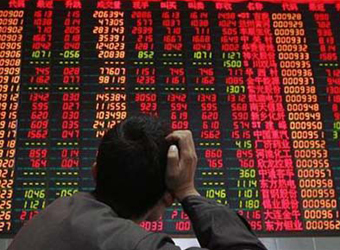Japan’s Nikkei 225 fell 0.58 percent while the Topix index was down 0.39 percent.
Shares of Takeda Pharmaceutical fell 6.18 percent after news emerged that the company increased its acquisition offer for London-listed drugmaker Shire, to about 46 billion pounds ($64 billion).
In South Korea, the Kospi declined 0.96 percent. Hong Kong’s Hang Seng index fell 0.82 percent. Chinese mainland markets were also lower with the Shanghai composite declining by 0.31 percent and the Shenzhen composite was near flat.
Australia and New Zealand markets are shut for the Anzac day public holiday.
“Risk off sentiment heightened after the 10-year U.S. Treasury yield touched 3 [percent] handle for the first time since Jan. 2014,” analysts at Singapore’s OCBC Bank wrote in a morning note.
“The normalization of U.S. yield at a faster than expected pace raised the concern about equity valuation, which led to increasing market volatility,” they wrote. The analysts added that the recent dollar surge paused despite investors trying to “re-establish the correlation between dollar and higher yields.”
The dollar index, which measures the greenback against a basket of currencies, traded at 90.841 as of 11:24 a.m. HK/SIN. The index rose from levels below 90.00 reached in the previous week and briefly crossed the 91.00 level in the Tuesday session.
The Japanese yen traded at 108.9 to the dollar while the euro fetched $1.2228.
Oil prices fell overnight as concerns that the U.S. might reinstate sanctions against Iran faded.
President Donald Trump on Tuesday said that the U.S. could soon reach an agreement with France that would preserve the 2015 Iran nuclear deal.
Trump made his comments during a news conference with French President Emmanuel Macron, who is trying to dissuade his American counterpart from pulling out of the accord.
Still, Eurasia Group analysts said in a note that it did not change their “overall call that the Iran nuclear deal has a 65 [percent] probability of collapsing during Trump’s first term.”
But many analysts also believe that an oil market slump which started in 2014 has ended and that a sustained price rally is likely due to supply disruptions and strong demand from Asia, according to Reuters.
On Wednesday during Asian hours, oil prices were near flat — U.S. crude traded near flat at $67.69 and global benchmark Brent was at $73.90 per barrel. Source: CNBC
Source: CNBC


